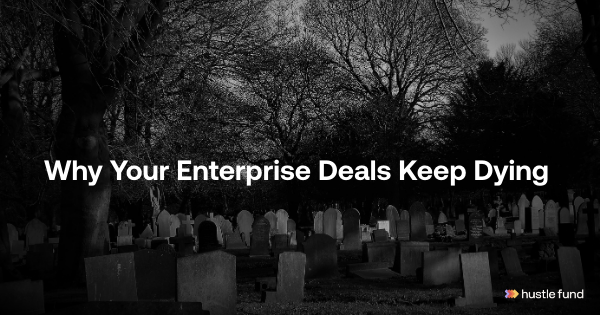SOC 2 for startup founders-what it is
SOC 2 for Startup Founders: What it is (and why it’s going to impact your enterprise deals)
Landing an enterprise client is a dream-come-true for most startup founders.
A deal like that could unlock game-changing revenue, open the doors to VC investment, attract impressive candidates, and take your startup to the next level.
But one question from the client could ruin everything: "Can you send us your SOC 2 report?"
Uhhhh… what? What the heck is SOC 2? And why is it standing between you and your biggest deal?
Deep breath – we’ve got this. Today we’re going to break down everything you need to know about SOC 2. We’re also going to look at a startup that turned compliance from a roadblock into a $2.3 million revenue unlock.
Real quick before we get started: this article is written in partnership with Delve – a platform that solves compliance in days… not months. Delve’s team knows everything there is to know about compliance.
Ok, on to the article.
What is SOC 2?
Honestly? I had never even heard of SOC 2 before I met Delve.
Just in case you hadn’t either, let’s break down what it is.
SOC 2 is kinda like a report card for how well your company protects customer data.
Big companies want proof that you're going to handle their information properly before they commit to doing business with you.
SOC 2 stands for "Service Organization Control 2." It's basically an independent auditor saying, "Yep, this company knows how to keep data safe."
The audit checks five main categories:
- Security: Are you protecting data from hackers and breaches?
- Availability: Is your system reliable and accessible when customers need it?
- Processing Integrity: Does your system work accurately and as promised?
- Confidentiality: Are you actually keeping private information, um, private?
- Privacy: Are you handling personal data responsibly?
Most companies focus on security only (nobody wants to be the next data breach headline), but the others matter too, depending on what you do.
Why Should You Care About This?
SOC 2 isn't a nice-to-have. Startups need it if they wanna do business with enterprise companies.
No shocker why. Data breaches cost companies millions of dollars. Nobody wants to be the one who chose the vendor that caused the breach.
SOC 2 compliance tells these companies that you're not gonna be a liability. And that’s why 74% of enterprise buyers require SOC 2 before they'll even consider working with you.
It all sounds reasonable… but the lift on startups can feel overwhelming.
The old-school approach involves a bonkers number of spreadsheets, un-translatable auditor jargon, and a massive time suck for your whole team.
The Timeline Reality Check
Turns out, SOC 2 Type II has a mandatory 3-month observation period. That's three months where auditors watch your security controls in action.
You literally cannot speed this up, no matter how much money you throw at it.
And that's just the observation period! Before that starts, you need to:
- Set up all your security controls
- Create documentation and policies
- Train your team
- Fix any gaps the auditors find
Most enterprises want SOC 2 Type II (the full version), not just Type I (the lighter version). So if you're hoping to close that big enterprise deal in Q4, you better start your compliance journey in Q1.
The Cost
The cost of getting SOC 2 certified is significant. Traditional methods include:
- Auditor fees: $5,000-$50,000+ (depends on company size and complexity)
- Internal team time: 100-200+ hours across the whole team
- Consultant fees: $30,000-$90,000 if you need help with the process
Then there are the hidden costs:
- Opportunity cost: Deals you can't pursue while you're not yet compliant
- Team productivity: Your engineers dropping everything to hunt down compliance evidence
- Rush fees: Premium pricing when you're trying to rush the process
Platforms like Delve are totally changing the economics. They’re using AI to automate the manual work, which cuts down the time suck for your team by like 80%.
And this drives down the price in a big way.
The Tech Requirements are a Doozy
SOC 2 isn't just paperwork. You need technical infrastructure, too.
- Access controls: Multi-factor authentication, role-based permissions, regular access reviews
- Logging and monitoring: Comprehensive audit trails, security monitoring, incident response procedures
- Data protection: Encryption at rest and in transit, secure backup procedures, data retention policies
- Vendor management: Security assessments of all your third-party tools and services
- Documentation: Policies, procedures, incident response plans, employee training records
My brain just exploded. Yours too?
Implementing all this stuff takes time and technical talent, which is why starting early is crucial.
How Lovable Handled Their SOC 2
Story time!
You probably know the newly-minted unicorn Lovable. They’re a primarily PLG product, but enterprise was a big part of their internal push to cross $100m in ARR.
Lovablesx’s solution is perfect for enterprise companies that want to let all departments – not just technical folks – build and deploy internal tools.
Problem was, they kept getting shut down because they didn’t have SOC 2 compliance.
Lovable’s founders had tried compliance before, and it was a nightmare. The founders resented the fact that the whole process was slowing down their team.
Everything they read told them that getting compliant would take 6 months or more. But their team was super lean. They didn’t have the bandwidth to have someone manage this process. Meanwhile, huge deals were slipping away.
Then they discovered Delve.
The Turning Point
Delve changed everything for Lovable.
Instead of 170 random compliance tasks, Delve organized everything into a clear workflow. The platform showed exactly what needed attention at the team level, technical level, and company level.
The interface was jargon-free, so everyone on the team could understand and complete tasks quickly.
And here’s the best part: Delve's AI automation. It kicked in once they integrated with Lovable’s infrastructure.
The platform scanned their systems for compliance gaps and provided clear, actionable instructions – customized to their exact. technical. setup. And for Lovable, a company that provides deployment services for MILLIONS of projects, that was huge.
No more generic advice that didn't apply to their situation. No more manual evidence gathering. The AI agents did the heavy lifting while the team stayed focused on building their product.
The Results
Delve got them fully compliant in less than 20 days.
And the impact was massive. Lovable closed millions in contracts that had been stuck in limbo – like Cognizant and Microsoft – thanks to the compliance issue.
This isn’t about Delve – it’s about you
Everywhere you look, founders are trying to close enterprise deals, and failing because of what is essentially a report card.
You don’t have to be that person. You can be the person that closes those deals successfully.
The key is starting early so you’re not hit with a surprise requirement inches before you land a contract.
That, and automating the manual work.











